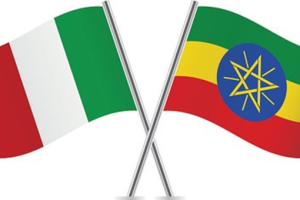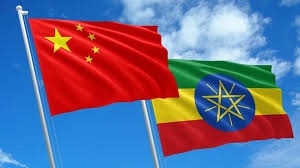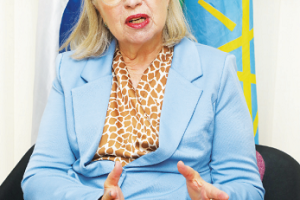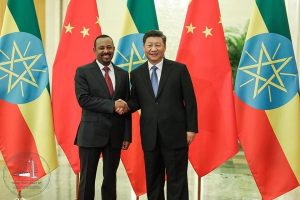
The issue of climate change continues to be a topic of intense debate, with no clear or sustainable solutions emerging. Countries around the world are being forced to grapple with the burdens and challenges posed by the impacts of climate change. The problem is particularly serious in developing and underdeveloped nations, which often lack the resources and infrastructure to effectively adapt and mitigate the effects.
Despite numerous global summits and conferences held over the years, a core, universally accepted solution to the climate crisis has remained vague. As a result, vulnerable countries are struggling to tackle this scary challenge, resorting to a variety of actions and initiatives in an effort to address the problem.
One of the mechanisms being employed to address the issues arising from climate change is the planting of trees. In this regard, Ethiopia has been actively working on this initiative, especially over the last five years, by planting around over thirty two billion seedlings. These seedlings are being planted under the “Green Legacy initiative,” which was launched in 2019.
The initiative involves the planting of trees, fruits, and cattle feed seedlings not only to restore green cover but also to create jobs and ensure food security in Ethiopia. The country is currently exporting fruits such as avocado, papaya, and mango in the region, thanks to the Green Legacy Initiative.
The Green Legacy Initiative (GLI) has continued to gather momentum, with the latest push taking place on August 23, 2024. On that day, Ethiopians from all walks of life participated in a nationwide tree-planting campaign, with the ambitious goal of planting 600 million saplings in a single day. Aftermath, Prime Minister Abiy Ahmed (PhD) confirmed that a record-breaking 615.7 million tree seedlings were indeed planted across 318.4 hectares of geospatially mapped sites throughout the country.
The Green Legacy Initiative has also caught the attention of the international community. Various diplomatic representatives based in Addis Ababa have been actively involved in the country’s tree-planting efforts. This suggests that Ethiopia is not only working to address its domestic climate challenges, but is also engaging in “green diplomacy” using its environmental initiatives as a means of fostering international cooperation and collaboration.
The experience gained by Ethiopia in its tree-planting efforts has also been shared with other countries, as evidenced by the country’s participation in a knowledge-sharing event in the 2023 United Nations Climate Change Conference, COP28, which was the 28th United Nations Climate Change Conference at Expo City Dubai last year. This further underscores Ethiopia’s commitment to positioning itself as a global leader in the fight against climate change.
In a display of environmental stewardship, Ethiopia’s efforts to green the country have gained international recognition and support. As part of the country’s Green Legacy Initiative, launched by Prime Minister Abiy Ahmed (PhD), various government and diplomatic representatives have joined in tree-planting campaigns across the nation.
In the capital city of Beijing, Tefera Derebew, Ethiopia’s Ambassador to China, along with embassy staff, participated in a tree-planting initiative, demonstrating Ethiopia’s commitment to the Green Legacy. Similarly, in Addis Ababa Alexander Evstigneev, Director of the Russian Center for Science and Culture expressed his support for Ethiopia’s environmental sustainability efforts. Evstigneev emphasized the significance of this historic national moment and pledged to help ensure the survival of the trees he planted, underscoring the importance of both community and governmental efforts in creating a greener Ethiopia.
Evstigneev praised Ethiopia’s efforts to enhance its green legacy, particularly through the restoration of forest coverage and natural resources. He noted that, the GLI and the tree-planting event symbolize Ethiopia’s dedication to leaving a thriving, sustainable environment for future generations.
Leaders and staff of the Ethiopian Embassy in Abidjan, Côte d’Ivoire, also joined the tree-planting efforts, with Ethiopia’s Ambassador to that country, Shitaye Minale, taking part in the initiative.
The U.S. Ambassador to Ethiopia, Irvine Masinga, highlighted the importance of the GLI for increasing agricultural productivity and preventing soil erosion in low-lying areas of the country. He affirmed that, the U.S. government would continue to support Ethiopia’s land and forest protection initiatives in collaboration with various stakeholders.
The Danish Embassy in Addis Ababa also expressed its participation in the tree-planting campaign, noting their pride in collaborating with Ethiopia to combat climate change. They reiterated their contribution to Addis Ababa’s goal of planting twenty million trees this year, in alignment with the national target of increasing forest cover to 30 per cent by 2030.
The Green Legacy Initiative aims to plant 7.5 billion seedlings nationwide this year, and CorpsAfrica volunteers have joined Ethiopians in the tree-planting campaign, underscoring the significance of such actions to mitigate climate change.
Furthermore, experts who attended the 46th meeting of the United Nations Framework Convention on Climate Change (UNFCCC) Least Developed Countries Expert Group (LEG) in Addis Ababa between August 19 and 22, 2024, praised Ethiopia’s dedication to undertake substantial environmental protection activities to achieve sustainable development.
Maria Ashili, an expert from the United States, said that Ethiopia’s commitment to combat climate change impacts through the Green Legacy Initiative is encouraging and a good example to the world. She noted that the country’s pledge to plant 600 million seedlings in a single day will contribute significantly to global efforts.
Gabriel Kapaka, a Sierra Leonean expert, expressed that the actions taken by the government and people of Ethiopia regarding environmental protection are encouraging, and it is the responsibility of all to continue this effort. He explained that tree planting is an international activity, and Ethiopia’s extensive undertaking of such work contributes to global efforts to reduce global warming.
Ethiopia’s commitment to environmental sustainability and its Green Legacy Initiative have garnered worldwide attention and support, positioning the country as a role model in the fight against climate change.
The issue of climate change remains a complex and multifaceted challenge, with no easy solutions. However, the efforts of countries like Ethiopia, through initiatives such as the Green Legacy, demonstrate that concerted, large-scale action can make a meaningful difference. As the world continues to grapple with the impacts of climate change, the experiences and lessons learned from Ethiopia’s tree-planting campaign may provide valuable insights and inspiration for other nations seeking to tackle this pressing global issue.
BY EYUEL KIFLU
THE ETHIOPIAN HERALD TUESDAY 27 AUGUST 2024





